Recent Water Damage Posts
We are here to help
2/6/2023 (Permalink)
In any water damage event, the goal is to dry out the wet materials as soon as possible in order to prevent them from having to be replaced. When water is left to sit for an extended period of time, it makes the floor and other affected materials unable to be dried completely. This can lead to floor covering, sub floor, cabinets, and other wet materials needing to be replaced. It is more expensive and more time consuming to replace these items than it is to restore them. In addition to that, mold begins to grow just 48 hours after wet materials are left to sit untreated. The effects from water damage happen quickly and need immediate action to avoid damage and costly repairs. SERVPRO of Wilson/Nashville arrives at your home quickly and ready to return your home back to preloss condition.
Learn more about our residential and commercial services :
Residential
- Water Damage Restoration
- Fire Damage Restoration
- Storm Damage Restoration
- Mold Remediation
- Cleaning Services
- Building Services
Commercial Services
- Commercial Water Damage Restoration
- Commercial Fire Damage Restoration
- Commercial Storm and Major Events
- Commercial Cleaning Services
- Commercial Mold Remediation
Have Questions? Call– 252-291-4492
- 24-Hour Emergency Service
- Faster to Any-Sized Disaster
- Highly Trained Restoration Technicians
- A Trusted Leader in the Restoration Industry
- Locally Owned and Operated
- Advanced Restoration and Cleaning Equipment
Water Damage Timeline
10/4/2022 (Permalink)
Within Minutes
- Water quickly spreads throughout your property, saturating everything in its path.
- Water is absorbed into walls, floors, upholstery, and belongings.
- Furniture finishes may bleed, causing permanent staining on carpets.
- Photographs, books, and other paper goods start to swell and warp.
Hours 1 - 24:
- Drywall begins to swell and break down.
- Metal surfaces begin to tarnish.
- Furniture begins to swell and crack.
- Dyes and inks from cloth and paper goods spread and stain.
- A musty odor appears.
48 Hours to 1 Week:
- Mold and mildew may grow and spread.
- Doors, windows, and studs swell and warp.
- Metal begins to rust and corrode.
- Furniture warps and shows signs of mold.
- Paint begins to blister.
- Wood flooring swells and warps.
- Serious biohazard contamination is possible.
More Than 1 Week:
- Restoration time and cost increase dramatically; replacing contaminated materials and structural rebuilding may be extensive.
- Structural safety, mold growth, and biohazard contaminants pose serious risks to occupants.
About SERVPRO of Wilson/Nashville
SERVPRO of Wilson/Nashville specializes in the cleanup and restoration of residential and commercial property after a fire, smoke or water damage event. Our staff is highly trained in property damage restoration. From initial and ongoing training at SERVPRO’s corporate training facility to regular IICRC-industry certifications, rest assured our staff is equipped with the knowledge to restore your property.
What can U do to prevent water damage?
8/15/2022 (Permalink)
- Replacing shingles, repairing roof and siding
- Repair leaks when located.
- Make sure all openings in your roof or home are sealed properly.
- Make sure your gutters and downspouts are clean and clear for proper drainage.
- Ensure the crawl space vents are free of obstruction, to allow proper ventilation under your home.
Signs that you have water damage.
- Visible paint discoloration or peeling.
- Soft or sagging walls or ceiling and flooring
- Water stains around bathroom vents
- Water stains around oven hood/vents
Homeowners that have done all that they could do but, still experience water damage can call SERVPRO of Wilson/ Nashville. SERVPRO of Wilson/ Nashville is available 24 hours a day for water emergencies, large or small. When you are dealing with water damage, immediate action is crucial. A delay of just a few hours can greatly increase the severity of the water damage.
Craw space helpful tips
7/1/2022 (Permalink)
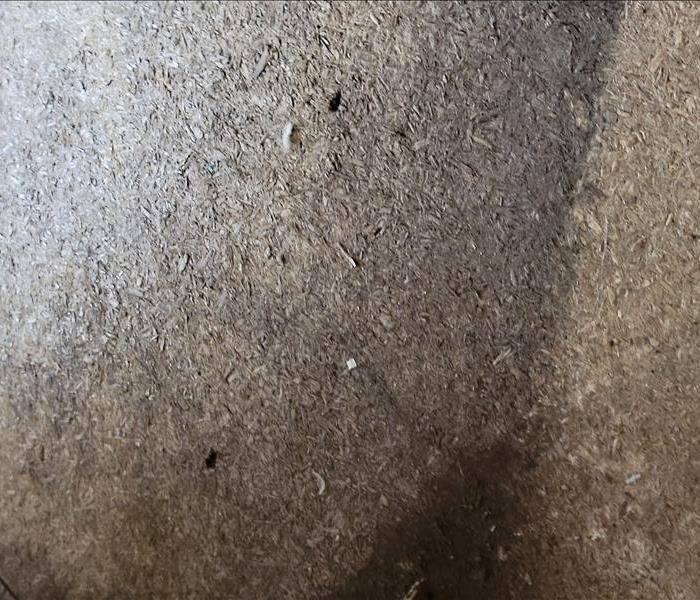 Water in crawl space can lead to warped sub floors.
Water in crawl space can lead to warped sub floors.
Standing water in crawlspace could mean you have a leak in a pipe or a drain. It may lead to structure damage or mold.
What to check in crawlspace
- Crawlspace door- Loose-fitting or opened
- Vapor barrier- repair or replace if needed.
- Properly installed insulation.
- Moisture- Condensation on vapor barrier and HVAC equipment.
- Mold- Extreme moisture can also lead to mold.
- Musty odor
- Standing water- To help this issue, install sump pump.
- Standing sewage
- Warped floors
- Uninvited pest (mice, insects, and termites)
Our skilled technicians are experienced in navigating through crawlspaces to perform a variety of different services. Water and fire mitigation/repairs, mold remediation, sewage back-up, and biohazard clean-ups are the most common services. Call SERVPRO of Wilson/Nashville water damage restoration. (252)291-4492
Five things that could cause pipes to burst
2/18/2022 (Permalink)
Freezing Pipes
- Open kitchen and bathroom cabinets to allow warmer air to circulate around the plumbing
- Turn faucet on to allow water to drip, even a small amount of running water will prevent freezing
- Set thermostat to a temperature no lower than 55 degrees F
- For long term solutions, add insulation to attics, basements, and crawlspaces and seal cracks/holes around windows and doors to keep warm air inside
Corrosion - Some types of corrosion eat away at pipes, which lead to small cracks and can in time lead to pipes bursting.
Water Pressure - increase in water pressure can or burst especially when pipes or weak pipes cause pipes to leak.
Clogs in pipes -
hair
dirt
Oil and grease
Objects that are flushed -sanitary products, cotton swabs, wax, and toys are just a few examples.
Aging pipes - depending on the type of pipes may determine the lifespan. Determining if this is the problem you may notice a change in the color of water or color of the pipes.
Helpful tips for winter
11/11/2021 (Permalink)
At anytime a pipe can burst inside your home and causing a water damage. But when temperatures start dropping below 20 degrees Fahrenheit water pipes can freeze causing a water damage. One of the top winter water damages is frozen pipes Water that freezes inside a pipe can build pressure inside causing the pipes crake or burst.
Helpful tips for preventing frozen pipes:
Increase your heat setting by a couple of degrees
Let your faucet drip
Seal cracks and holes where cold air can come into your home.
Keep temperature of your home at least 55 degrees Fahrenheit
Doors to keep open - cabinet doors under kitchen and bathroom sinks.
Doors to keep closed- Homes with garage keep the garage door closed and doors to crawl space.
Water damage in attic
10/4/2021 (Permalink)
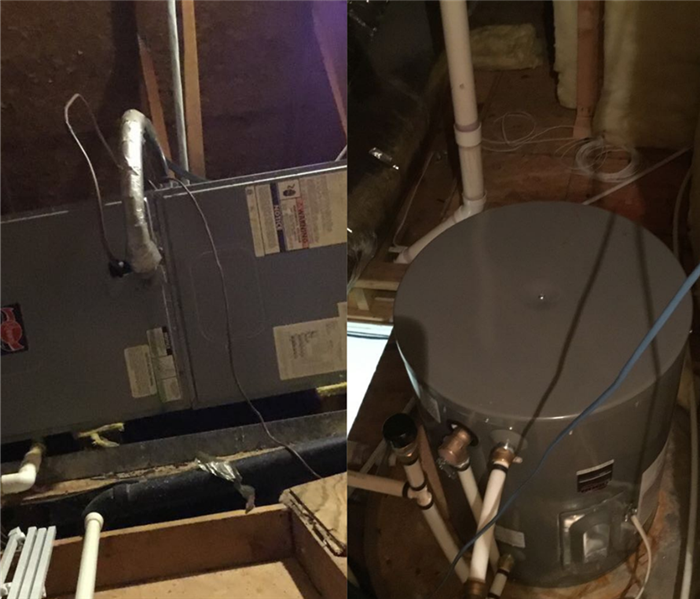 Proper maintenance to hot water heater and HVAC system will help prevent a water damage in the attic.
Proper maintenance to hot water heater and HVAC system will help prevent a water damage in the attic.
Water in attic most often occurs during heavy rainfall. But, roof leaks are not the only thing that can cause a water damage in your attic. Water damage in your attic can damage more than you realize. Water in your attic may cause damage to ceiling, structure, and insulation.
Causes of Water damage in the attic-
Hot water heater: Routine maintenance, also check water lines, and tank for crack, rust or corrosion.
HVAC system: Routine maintenance: Replace filters every 1-3 months. Remove water from drain pan to prevent over flow and check connections.
Roof leaks- due : cracked, damaged, missing shingles, and visible debris.
Ventilated: Make sure your vents are not blocked, clogged, or damaged.
Need Emergency Service? Call SERVPRO of Wilson/Nashville 24/7 – (252)291-4492
Hidden places water can hide
8/13/2021 (Permalink)
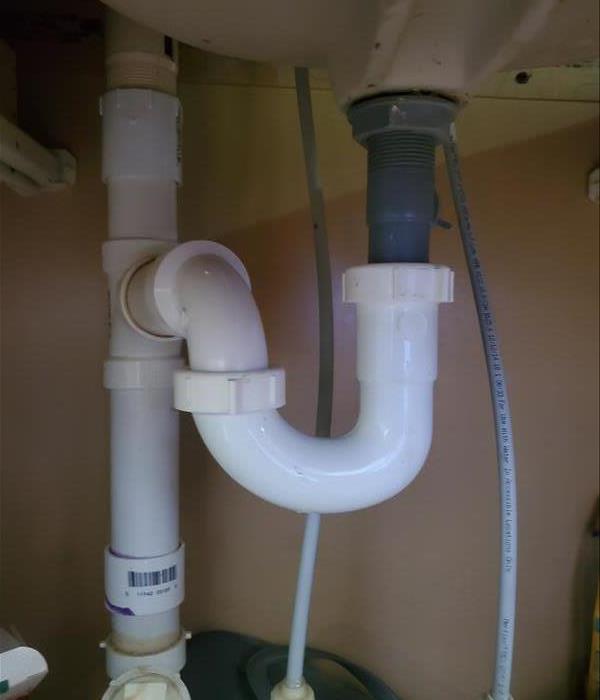 Piping underneath a bathroom sink is one of the main hiding places for water damage.
Piping underneath a bathroom sink is one of the main hiding places for water damage.
Some leaks go undetected, but cause major damage over time. One factor that may help you indicate a hidden water damage is an extremely high electric or water bill. This may be the one time a sudden increase in your bills might actually save you money in the future.
Hidden places water may be hiding that damage your home overtime.
Behind the washing machine- Leaks can develop in the water supply lines that run to the washing machine. Since you can’t see behind the washing machine, over time a slow leak can do serious damage to the subfloor, walls and baseboards.
Underneath sinks in the bathroom and kitchen- If not checked regularly a water damage may go unnoticed. A slow leak in the bathroom and kitchen may damage subfloor, walls, cabinets, and baseboards.
Under Refrigerator-A leak from lines to the refrigerator may go unnoticed, you may never see standing water behind your refrigerator. A slow leak can damage subfloor, walls , baseboards and cabinets.
Leaks from piping, roofs, and other overlooked area can cause water damages that can go unnoticed for extended periods of time.
Craw space helpful tips
7/1/2021 (Permalink)
For some craw space is the last thing any worries about. It's the part of the home you don't see. But, it is the one thing that can help your home stay intact. Prolonged water in your craw space can cause serious problems not only to your home but to your pocket as well.
Prolonged water in craw space long term damage:
Over time beams, joists and subflooring may start to rot.
If prolonged water goes unnoticed mold will also be an issue.
Things to do to prevent water damage in craw space:
Check your vapor barrier cracks, tears, or frayed.
Make sure down spouts are directed in a way that water flows away from your craw space
If you live in a flood zone consider a foundation drain system
Install a sump pump with a battery backup
When it rains it pours!
2/19/2021 (Permalink)
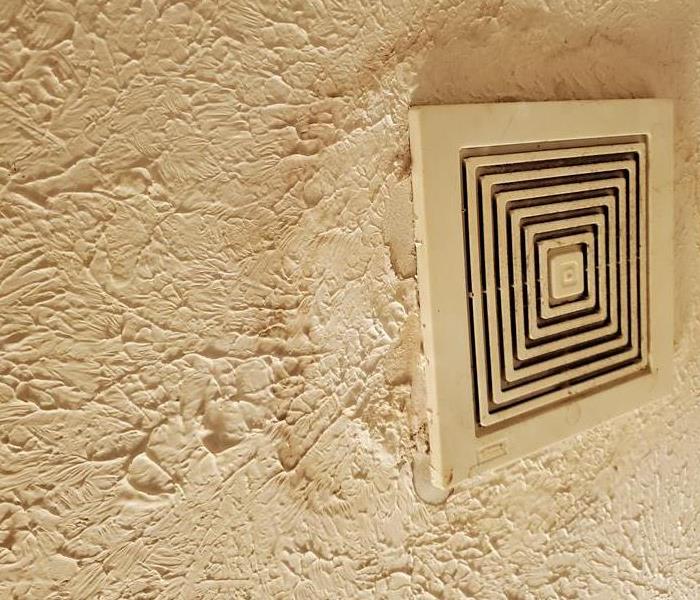 Continuous rain in Wilson/Nashville area cause this over time if not noticed.
Continuous rain in Wilson/Nashville area cause this over time if not noticed.
Rain under normal circumstances does not usually cause damage to your home. But underlying conditions may change normal maintenance to major restoration. One condition may be not replacing old shingles on roof after weather event. Also, windows and openings in roof and siding that are not sealed properly can cause unseen damage. Lastly, heavy, or continuous rain may cause water to pool around your home. Water pooling around your home may cause damage to your foundation. Maintaining your home may prevent rain from damaging your home.
What can I do you ask?
- Replacing shingles, repairing roof and siding
- Repair leaks when located.
- Make sure all openings in your roof or home are sealed properly.
- Make sure your gutters and downspouts are clean and clear for proper drainage.
- Ensure the crawl space vents are free of obstruction, to allow proper ventilation under your home.
Signs that you have water damage.
- Visible paint discoloration or peeling.
- Soft or sagging walls or ceiling and flooring
- Water stains around bathroom vents
- Water stains around oven hood/vents
Homeowners that have done all that they could do but, still experience water damage can call SERVPRO of Wilson/ Nashville. SERVPRO of Wilson/ Nashville is available 24 hours a day for water emergencies, large or small. When you are dealing with water damage, immediate action is crucial. A delay of just a few hours can greatly increase the severity of the water damage.
Frozen Pipes Can Cause Big Damage
11/11/2020 (Permalink)
The Wilson/Nashville area has begun to cool down and is in the transition from heat and humidity to cooler winter weather. With cool, freezing temperatures brings an increased chance of freezing pipes.
Cold temperatures can cause water pipes to freeze. Freezing inside a pipe creates a lot of pressure which can cause the pipe to burst and likely lead to serious flooding, especially when there is no one around to turn off the water. If you notice your pipes have frozen, you will want to thaw them before they break. Thaw them by first locating the pipe and opening the faucet. Then apply heat near the faucet and work your way down. You can use a hair dryer, hot towels, a portable space heater or heat lamp, or electrical heating tape, but never use an open flame as that could cause your pipes to break.
If that seems a little intimidating, here are some preventative measures you can take to protect your water pipes from freezing during those cold spells.
- open kitchen and bathroom cabinets to allow warmer air to circulate around the plumbing
- let cold water drip from a faucet, even a small amount of running water will prevent freezing
- if you plan to be out of town, set thermostat to a temperature no lower than 55 degrees F
- for long term solutions, add insulation to attics, basements, and crawlspaces and seal cracks/holes around windows and doors to keep warm air inside
Should you ever experience flooding or damage from a broken water pipe in your home, call SERVPRO of Wilson/Nashville.
Flooded Basement Cleanup and Restoration
10/5/2020 (Permalink)
A basement can flood at any time, although flooding most often occurs during heavy rainfall. Basements are more prone to flooding because they are the lowest level of a building and are normally built partly or entirely below ground level. There are a number of reasons why your basement could flood, including:
- A blocked or failed sewer pipe
- Heavy rain that causes surface water to pool around your home
- Sewer backup
- Foundation drainage failure
- Water supply-line break or hot water tank failure
- And many more
A flooded basement can jeopardize your health, safety, and your home’s integrity. It’s worth making a call to SERVPRO of Wilson/Nashville and let our trained, professional crews handle the situation safely and correctly. We have earned the trust of hundreds of homeowners, business owners, and property professionals.
The longer you wait, the worse the problem will get.
We are Flooded Basement Specialists:
- We are available 24 hours a day/7 days a week
- We are a preferred vendor to many national insurance companies
- We bill the insurance directly – one less thing for you to worry about
- Our technicians are highly trained in water restoration techniques
- We use IICRC Restoration Standards
- Advanced inspection and extraction equipment
5 Hidden Places Water Damage Could Be Hiding In Your Home
8/14/2020 (Permalink)
Water damage from a leaking appliance or from a flood can easily identified (although that doesn’t make it better). When water damage like that happens, it is very noticeable, but, there could be water damage in your house that you can’t even see. Here are 5 overlooked spots that could have water damage:
- In the wall beneath a window:Rain can seep in between the window sash and jamb and trickle down to the framing studs in the wall. Prolonged leaks can rot the studs and other framing, leading to expensive repairs.
- Under the siding:Unsealed gaps allow water to enter the siding and eventually rot the plywood beneath.
- The exterior door threshold:Since this is exposed to water every time it rains, eventually the wood will swell and become spongy. This damage may not be noticed until the wood rots and can no longer support the metal threshold.
- Beneath the dishwasher:Leaks can develop in the water supply line that runs to the dishwasher. Since you can’t see under the dishwasher, over time a slow leak can do serious damage to the subfloor. You may not notice until you move the washer to replace it with a new one, only to find you’ll have to replace some of the floor as well.
- Under a wobbly toilet:Water can leak from around the wax ring at the base of the toilet. It is likely you would not see any water at all but it will be soaking into the subfloor the whole time. Sometimes the first indication is the toilet starting to wobble due to the floor supporting it rotting away.
Call SERVPRO of Wilson/Nashville for your water damage rescue 252-291-4492
We Specialize in Flooded Basement Cleanup and Restoration
7/2/2020 (Permalink)
A basement can flood at any time, although flooding most often occurs during heavy rainfall. Basements are more prone to flooding because they are the lowest level of a building and are normally built partly or entirely below ground level. There are a number of reasons why your basement could flood, including:
- A blocked or failed sewer pipe
- Heavy rain that causes surface water to pool around your home
- Storm sewer backup
- Sanitary sewer backup
- Foundation drainage failure
- Water supply-line break or hot-water tank failure
- And many more
If flood water is not handled quickly and properly, it can jeopardize your health and safety, and cause severe damage to your home’s structure. The longer you wait, the worse the problem will get.
The bottom line: A flooded basement can jeopardize your health, safety, and your home’s integrity. It’s worth making a call to SERVPRO of Wilson/Nashville and let our trained, professional crews handle the situation safely and correctly. We have earned the trust of hundreds of homeowners, business owners, and property professionals.
We are Flooded Basement Specialists:
- We are available 24 hours a day/7 days a week
- We are a preferred vendor to many national insurance companies
- We bill the insurance directly – one less thing for you to worry about
- Our technicians are highly trained in water restoration techniques
- We use IICRC Restoration Standards
- Advanced inspection and extraction equipment
Water Damage Requires Immediate Action
2/17/2020 (Permalink)
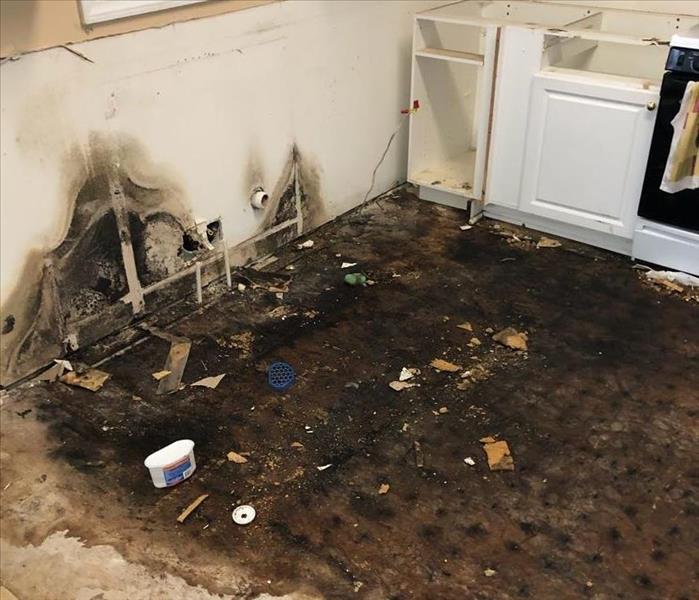 Wet materials were left to sit in this kitchen, causing wide spread damage and mold growth.
Wet materials were left to sit in this kitchen, causing wide spread damage and mold growth.
In any water damage event, the goal is to dry out the wet materials as soon as possible in order to prevent them from having to be replaced. When water is left to sit for an extended period of time, it makes the floor and other affected materials unable to be dried completely. This can lead to floor covering, sub floor, cabinets, and other wet materials needing to be replaced. It is more expensive and more time consuming to replace these items than it is to restore them. In addition to that, mold begins to grow just 48 hours after wet materials are left to sit untreated. The effects from water damage happen quickly and need immediate action to avoid worse damage and costly repairs. SERVPRO of Wilson/Nashville arrives at your home quickly and ready to return your home back to preloss condition.
Making Water Damage "Like it never even happened."
7/16/2019 (Permalink)
 Flooding and water emergencies don’t wait for regular business hours and neither do we.
Flooding and water emergencies don’t wait for regular business hours and neither do we.
Flooding and water damage can happen quickly and is very invasive. Water quickly spreads throughout a property and gets absorbed into floors, walls, and furniture and can of course cause stress and worry. However, when we arrive on site, we quickly start the water extraction process almost immediately. Our fast response helps minimize the damage and the cleaning and restoration costs to you. Our advanced drying methods allow us to respond quickly to your water removal and cleanup needs, and also helps prevent secondary damage and mold.
Common causes of water damage include flooding caused by severe weather, plumbing leaks, sink, bathtub, or toilet overflow, and sewage backup. But, did you know: more water damages are caused by broken pipes, plumbing, or appliance malfunctions than from weather related issues? This is one reason why it is important to take proper care of and maintenance your plumbing and appliances in order to prevent a water disaster.
SERVPRO of Wilson/Nashville provides emergency cleaning and restoration services 24 hours a day, 7 days a week—including all holidays.
The "Rainy Season" and Sewage
4/2/2018 (Permalink)
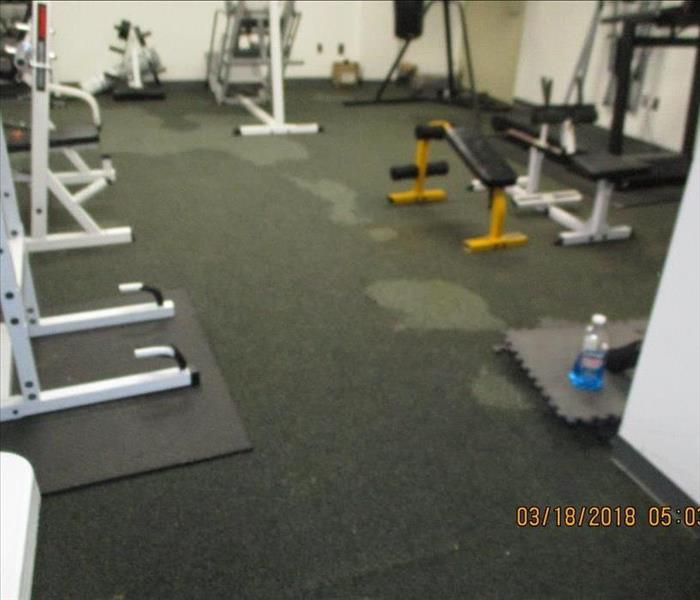 This government building sustained an extensive sewage back-up. All of the carpet will be removed and all of the contents will need to be sanitized.
This government building sustained an extensive sewage back-up. All of the carpet will be removed and all of the contents will need to be sanitized.
The "Rainy Season" and Sewage
There is a language particular to a trade or profession that can be confusing to the average person when taken out of context. In regards to the Professional Water Damage Restorer, this lingo becomes part of their lifestyle. With a few simple words, our Professional Water Technicians understand immediately the severity of the damage and can quickly prepare to handle the job. Water Damages are classified by Water Class and Water Category.
Water Class:
Class 1: Only part of a room or area is wet or larger areas containing materials that have absorbed minimal moisture. Little or no wet carpet and/or pad is present.
Class 2: An entire room or more is affected. Carpet and pad may be wet. Water has wicked up the walls less than 24 inches. There is significant moisture remaining in structural materials.
Class 3: Fully involved. Water may have come from overhead. Ceiling, walls, insulation, carpet, pad and sub-floor in virtually the entire area are saturated.
Class 4: Specialty drying situations - Wet materials with very low permanence/porosity (hardwood, concrete, brick). Typically, there are deep pockets of saturation, which require very low specific humidity.
Water Category:
Clean: Water that does not pose substantial harm to humans. (Examples: Broken water supply lines, water heaters, toilet tanks, tub and sink overflows, rain, snow)
Gray: Examples include discharge from dishwashers, washing machines, Fish tanks, toilet bowls without solid waste, and any water that contains chemicals, fungus or algae. If left untreated for 48 hours, this can turn into a Category 3 (Black Water)
Black: Examples include sewage and toilet backflows, river, stream and seawater flooding and sources with toxic pesticides or heavy metals. Typically, Category 3 is extracted, then the carpet and materials are removed and disposed.
A Black Water Damage is one of the worst situations for homeowners and business owners. Not only is the smell unpleasant, but can also be costly. Sewage back-ups in particular require having the area extracted, sanitized and demolished. Unfortunately, there are only so many preventative measure you can take to safeguard against a back-up.
Causes of Sewage Back-ups:
- Floods: As ground water rises, the pressure can cause sewage from sanitary sewer lines to reverse and back up into houses through drain pipes.
- Blockages: Flushing foreign objects or non-flushable sanitary products into the Sanitary Main; Sometimes a blockage is also the result of a combination of city and private trees where the roots penetrate the pipes. Usually if the sanitary main is affected the back flow happens slowly, giving the owner time to call a licensed plumber to assess the damage.
- Water in Basement: In many cases, soil settles adjacent to the building and, if not corrected, leads to rainwater flowing towards the building and down the outside of the foundation wall. This frequently happens when the ground is saturated after repeated or heavy rain storms. Drainage can be improved by making sure that water drains away from the building. Homeowners can also prevent flooding by water-sealing the basement. If water is entering your basement at a rapid rate, call the city public works office and report the problem immediately so that a city operator can investigate.
- Homeowners and business insurance do not cover flood damage or sewage back-ups. Most homeowner and business insurance policies do not cover sewer backup unless specific sewer backup coverage is added to the policy. Most homeowners and business owners may not realize that they are responsible for the maintenance and repair of their house or sewer lateral – the pipeline between the city sanitary sewer main, usually located under the street, and the building. The sewer lateral is owned and maintained by the property owner including any part that may extend into the street or public right of way. A cracked or deteriorated lateral or one filled with tree roots can allow groundwater to seep into the system, contributing to the possible sewer backup problems.
Information courtesy of Western National Insurance
https://www.wnins.com/resources/personal/features/sewerbackup.shtml





 24/7 Emergency Service
24/7 Emergency Service






